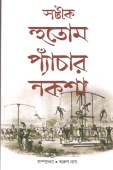
|
Related Articles: # The Owl's Gaze (book review)
Books by Kaliprasanna Sinha (incomplete list)  # The Observant Owl (tr. in English)  # Hootum Pnyachar Naksha
For Books by Kali[rasanna Sinha and others, visit |

 Kaliprasanna Sinha (1840 - 1870) Kaliprasanna Sinha (1840 - 1870)
Kaliprasanna Sinha was born in a rich zemindar family in Jorasanko, Kolkata, in 1840. In a short lifespan of only thirty years, he left lasting contributions in both Bengali literature and also on the society of that time. He attended the Hindoo College, but completed his education through English tutors at home. He was only thirteen years old when he established the Vidyotsahini Sabha, a society to discuss significant issues of the day. Later on, he entered the cultural milieu of Kolkata through Vidyotsahini Patrika (estd. 1855), a periodical, and Vidyotsahini Theatre (estd. 1856). He edited magazines such as Sarbatattva Prakashika (which dealt with Zoology, Geology, Arts and Literature), Bibidartha Sangraha, Paridarshak etc. When Rev. Long was fined Rs.1000, a huge sum, for translating Dinabandhu Mitra's play Neel-Darpan, it was Kaliprasanna who paid the fine on behalf of Rev. Long. Kaliprasanna also supported Harish Mukherjee, editor of Hindu Patriot in many ways. He had announced an award to promote widow remarriage. Author of several books—Babu (1854), Vikramorbashi (1857), Savitri-Satyaban (1858) and Malati-Madhab (1859)— his sharp satire Hutom Pnyachar Naksha (1862-1864), written under a pen-name, has been in print and in demand ever since. In this book, Kaliprasanna used colloquial Bengali in stead of the Sanskrit-laden language more usual at that time.
Encouraged by Ishwarchandra Vidyasagar, and with the help of a team of scholars such as Hemchandra Bhattacharya, Bhubanchandra Mukhopadhyay, and Nabinkrishna Bandyopadhyay, Kaliprasanna translated into Bengali The Mahabharata from the original Sanskrit. This is a huge contribution, and this book is popular till today.
Kaliprasanna's character occupies a significant part of Sunil Gangopadhayay's well known historical fiction Sei Samay, translated into English as Those Days by Aruna Chakravarty.
Published July, 2010
Click here to send your feedback
* To learn more about the ITRANS script for Bengali, click here. |
©Parabaas, 2010

.